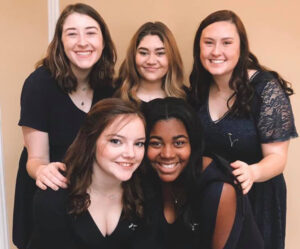

 By Emily Rosa-Woods, Theta Nu—Christopher Newport University
By Emily Rosa-Woods, Theta Nu—Christopher Newport University
I recently completed my term as chapter president, and I credit the energy and excitement I see within our chapter today with our participation in a program offered through the Fraternal Health & Safety Initiative (FHSI) nearly two years ago. When I came to CNU, I quickly learned that part of the campus culture focused on perfectionism. It was commonplace to hear students talk about how they needed to be perfect. Our chapter strived for perfection. We were doing everything we could to succeed and checking all the boxes.
Each year, we would host a hazing awareness campaign in conjunction with the Max Gruver Foundation, but we didn’t necessarily make a deeper connection with what hazing was until we held a program offered through FHSI. That’s when we learned that hazing for men and women were often very different. For women, it manifests with bullying, mean girl behavior, talking poorly about each other, and basically not being kind to one another.
It was difficult to talk about when we first started because of our perfect perception, but there were two key questions that helped us break through: What makes you feel heard? What makes you feel at home?
The hardest part of the process was waiting for the first person to share. After what seemed like forever, someone bravely started the conversation. She was a junior, one of our shyest chapter members. She shared how people didn’t reach out to her, and she didn’t feel included. Then, the freshman and sophomores began to talk about how the campus culture impacted them, and our juniors and seniors were able to talk about how they learned to fail and fail well. They talked about it openly and without shame. And that was just the beginning. We repeatedly had conversations focused on what our sisters needed to succeed and what we wanted to accomplish as a chapter.

Today, our chapter focuses on making time for these honest conversations. We remind our sisters that they can have a friend group, but that they are sisters with all of the women in our chapter. We have worked to increase connections within ADPi. The members who were seniors in the spring semester stayed actively engaged, even in the midst of a pandemic when our chapter moved to virtual experiences only. They mentored our new members and carried the message forward to help teach those following in their footsteps what “We Live for Each Other” really means.
I’ll be graduating this spring from CNU with a degree in business marketing and leadership. I’m not sure if I’ll move home to Fredericksburg, VA or elsewhere, but I do know that I love Alpha Delta Pi and I want to volunteer. I would love to help another chapter benefit from the lessons we’ve learned at Theta Nu, thanks in large part to these types of programs that are focused on the bettering the experience for our members and empowering our members to make change.
The Fraternal Health & Safety Initiative is designed to aid chapters of participating fraternities and sororities in achieving a high-quality membership experience. As the first sorority to join this consortium, Alpha Delta Pi collegiate members have access to a comprehensive curriculum focused on prevention and intervention strategies to tackle the most pressing and dangerous, social issues on college campuses today. The Alpha Delta Pi Foundation makes a grant each year to provide this resource to our chapter members.